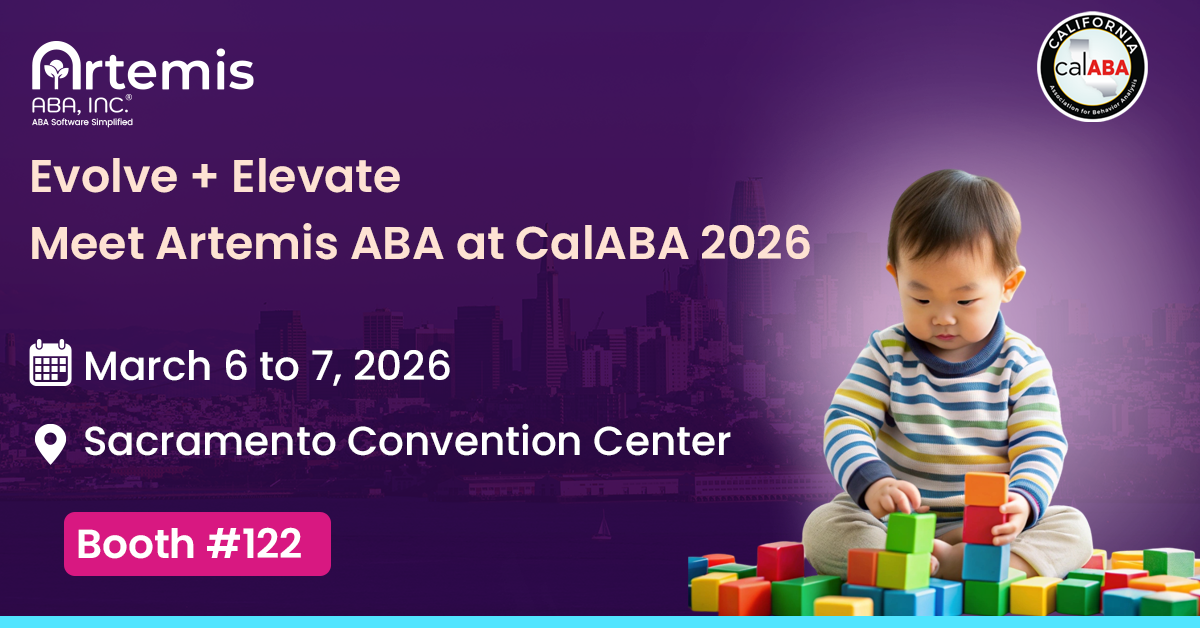Monday to Friday, 7 AM – 7 PM CST.
If you're reaching out outside these hours, please submit a support ticket—our team will respond as soon as possible.

How is AI Redesigning the Day-to-Day of ABA Therapists
A data-backed look at burnout, automation, and operational efficiency in ABA practices
Inside this article:
- How Bad Is Burnout in ABA?
- What Does AI Do in ABA Therapy Operations?
- What Measurable Results Can AI with Human Intervention Deliver to ABA Practices?
- What’s Coming Next in AI for ABA Therapy?
- How Artemis ABA Supports This Shift
What’s Driving Burnout in ABA Therapy Today?
ABA therapists and clinical teams are experiencing growing pressure—not from client care but administrative overload. A recent Behavioral Health Business survey found that 67% of ABA leaders rank administrative burden as their top challenge despite staffing shortages and reimbursement delays.
Therapists often spend nearly as much time completing session notes, fixing schedules, and handling billing work as they deliver therapy. This invisible workload leads to real consequences, especially burnout.
How Bad Is Burnout in ABA?
According to Behavior Analysis in Practice, 72% of RBTs report moderate to high levels of burnout, and documentation is one of the most frequently cited causes. Burnout doesn’t just affect individual performance; it drives up turnover, disrupts continuity of care, and slows growth.
Internal research from Artemis ABA shows that practices with outdated or disconnected workflows spend up to 10 hours per staff member per week on avoidable work. That’s a full day per week lost to inefficiency.
What Does AI Do in ABA Therapy Operations?
AI in ABA isn’t about replacing clinical judgment. It’s about reducing avoidable friction with human intervention as a balance. In modern ABA platforms, AI is already helping practices:
- Prevent scheduling errors by flagging overlaps and expired authorizations
- Show incomplete notes so RBTs know what’s missing and BCBAs can bulk-review faster
- Validate sessions against billing rules to reduce denials and claim delays
- Track behavioral progress trends without manual audits
These small improvements create meaningful operational changes when used consistently, and doesn’t completely alienate the human hand, as our work and judgement both are taken into account.
What Measurable Results Can AI with Human Intervention Deliver to ABA Practices?
Clinics using AI-enhanced ABA platforms report tangible gains:
These changes improve productivity, staff satisfaction, revenue predictability, and client outcomes.
Therapists can focus more fully on their clients. Billing teams shift from reaction to strategy. When the administrative burden drops, engagement rises. AI with human monitoring helps you hold onto your time without escalations or disruption to your workflow
What’s Coming Next in AI for ABA Therapy?
The next generation of AI features is already being developed under the course of human monitoring. Here’s what forward-looking ABA practices can expect:
- Predictive tools to balance caseloads and reduce clinician burnout
- Automated checks for session documentation to prevent compliance issues
- Real-time behavior trend tracking to optimize care
- Adaptive workflows that respond to session outcomes
These enhancements will make ABA operations faster— smarter, safer, and more sustainable.
How Artemis ABA Supports This Shift
At Artemis ABA, we believe technology should never get in the way of caring, it should make more room for it. That’s why we’ve built a platform that integrates AI-driven automation into the entire ABA workflow—from scheduling to documentation, billing, and compliance.
We don’t replace people. We protect their time. With human monitoring, we make sure the entire process is for the people, intervening at the right time, and advocating for the right cause.
AI is transforming ABA therapy by reducing administrative burdens, improving billing accuracy, and giving therapists more time for care.
Here’s how AI is helping ABA practices today:
- Reduces admin workload by 30–35% through automated scheduling and session tracking
- Decreases billing errors by up to 40% using real-time data validations
- Speeds up claim processing by 25%, improving cash flow
- Increases note completion rates by helping RBTs track progress and enabling BCBAs to bulk-review
- Enhances therapist presence by removing repetitive tasks and streamlining operations
AI in ABA doesn’t replace clinical judgment, it supports it, giving teams time to focus on what matters most: delivering consistent, high-quality care with human intervention.
Want to learn how AI can reduce burnout and unlock efficiency for your team?
Schedule Your Walkthrough
Please enter your details and one of our team members will contact you shortly
See Artemis in Action
Enter your information below






.png)






%201.webp)


